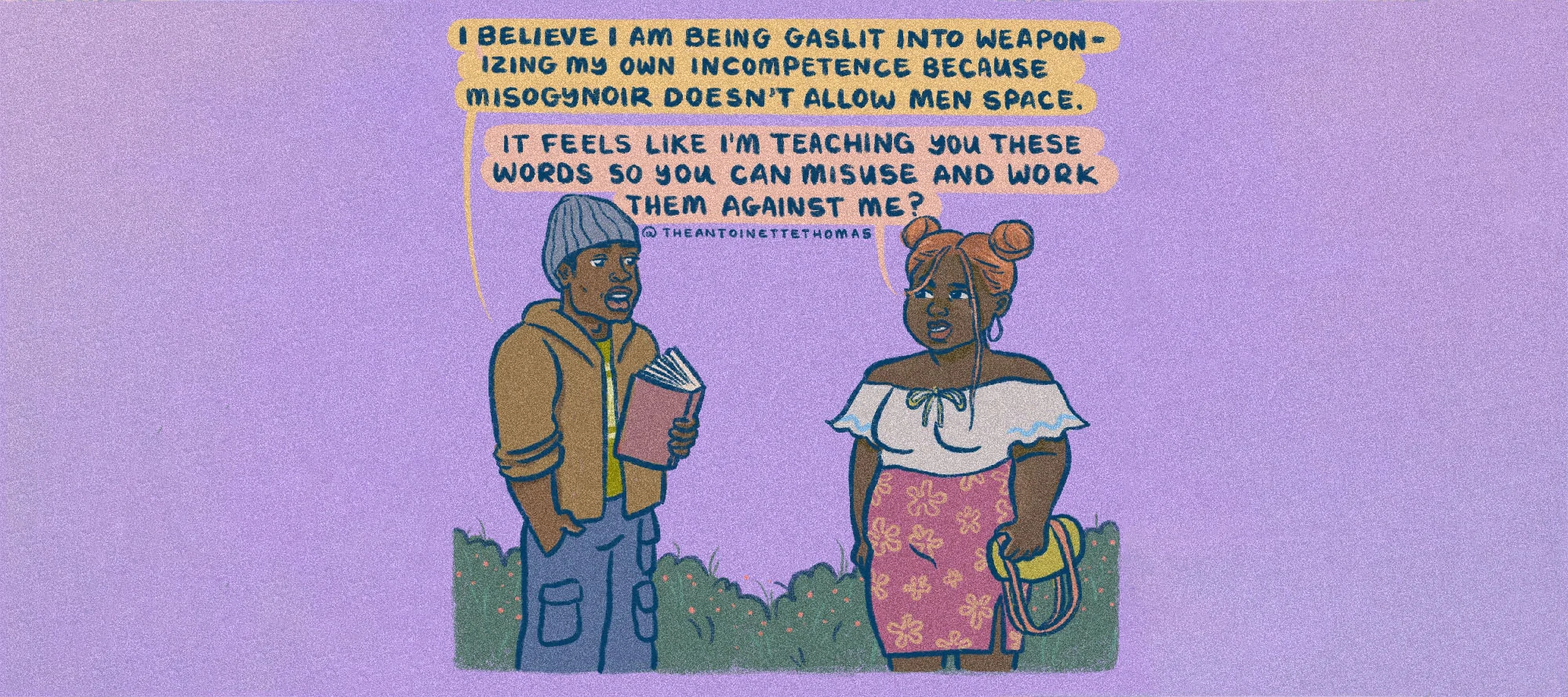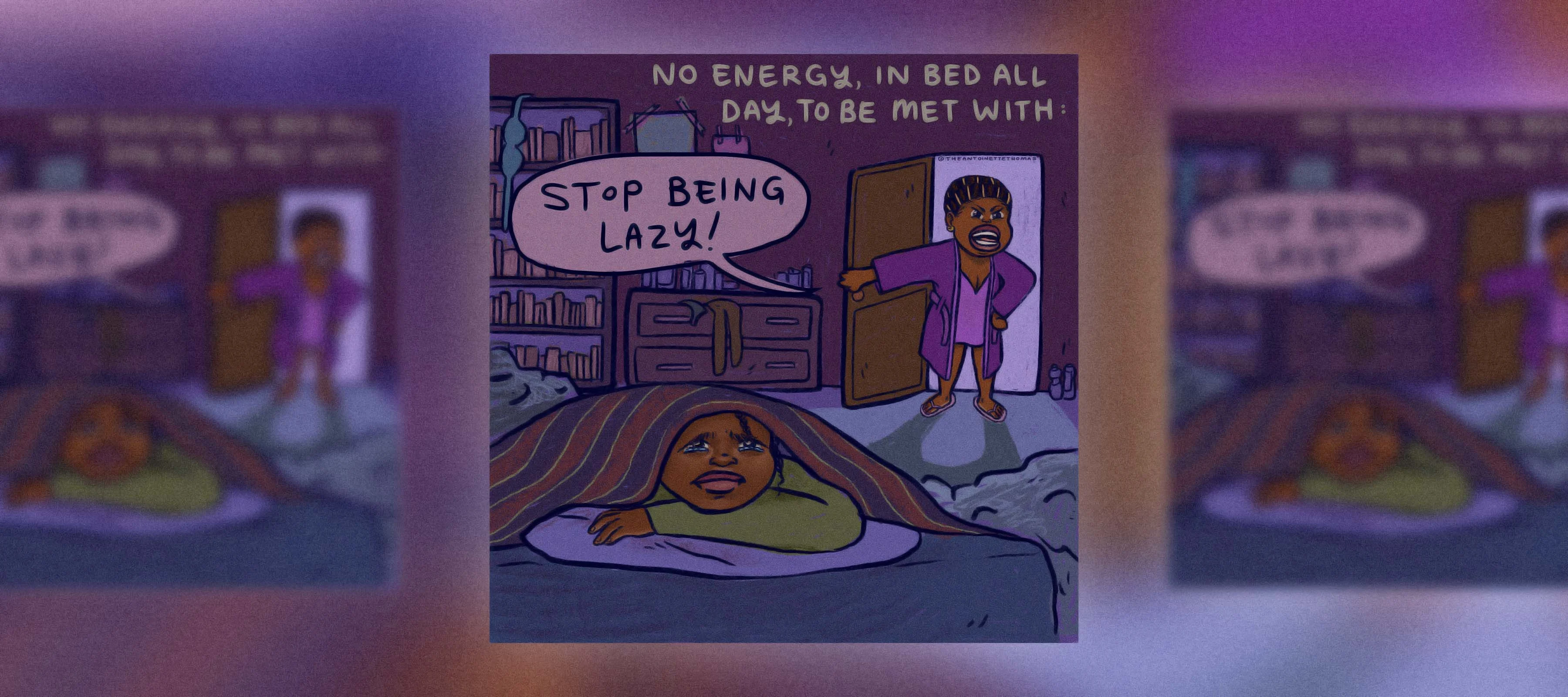When New Knowledge Becomes Weaponized
- 29 March 2022
- ByKatelina Eccleston

Big Cartel Art Works is our initiative to provide work, opportunity, and creative freedom to artists. As the pandemic has intersected with overdue discussions on racism and inequality, we’ve been commissioning some projects that stretch beyond our normal areas of expertise. Right now, it’s time to elevate marginalized artists and learn from stories that we all need to hear. We're doing our work to understand - and undo - the harm caused by systemic racism and racist atrocities.
Today, illustrator Antoinette Thomas and writer Katelina Eccleston dive into how new knowledge can be weaponized against those most disenfranchised.
From a quick FaceTime call, a tweet, or even a text message — the internet allows us to be more connected than ever, and sometimes, that abundance of information with our individual perspectives disconnects us more than is given credit for. With politics bulldozing through America’s divided public tide and certain media’s eagerness to prey on people’s anxieties, now more than ever consumers should be careful when digesting the information we’re presented with so casually. With tropes like fear-mongering or gaslighting across political spectrums, we should also be wary of the information we spread online so as to not do harm to others. Black women, in particular, seem to have been increasingly at the end of much of that harm including gaslighting that occurs on the web.
According to TIME, women are 10% more likely to attend psychotherapy; the ladies are doing ‘the work’ largely to increase control of their own lives. In fact, women used mental health treatment six months earlier than men in any three-year period. In true feminist fashion, women deter the imbalanced power dynamics that largely hurt them. Black women, who often gather the tools to combat those dynamics, go on to share those resources with others including Black men who at times, turn around and use it against them.
Now, although the ability to search and engage in and with topics that were otherwise out of reach is great access to have, it shouldn’t be confused with being an expert on these complex issues. It should also deter us from abusing our gendered based influence to inspire violence. This has been spreading on the web, like when rapper Tory Lanez attacked Megan Thee Stallion as he took advantage of Black Lives Matter rhetoric to “protect Black men” in order to advance his personal agenda. He created a petition to amplify opposition towards her. Or the multiple instances of men gaslighting women giving rise to viral responses to tweets like this one.
Editor's note: The profile from which the referenced tweet was cited has since become private. You may request to follow Nneka M. Okona on Twitter to view.
As internet users grow their vocabulary and defense lineup with resources on the web, cyber surfers, human beings, owe it to each other to be wary of how sensationalist tactics are used to dangerously water down the significance of powerful concepts to be weaponized. Considering a large amount of differing perspectives online, it is increasingly difficult to reach common ground on how to confront these issues we face today. The American tradition of focusing on one’s self in many instances doesn’t apply to Black women as they find themselves at the intersections of numerous social groups they don’t have the luxury of separating from. Like being both Black Female and Queer, Black Female Queer and Latina, Black Female Queer Latina and Disabled, etc. making some of them a part of multiple marginalized groups.
During this pandemic, for example, internet-frenzy-inspired cultures became increasingly popular including one that influenced glamorized self-care lifestyles. In fact, according to ASD online, between 2019 and 2020, Google Search Trends shows a 250% increase in self-care-related searches. With all of this focus on hyper individuality in combination with increased isolation, it is unsurprising that the shortage of empathy is trending upwards as well. This “focusing on myself” attitude goes far beyond any post online as this self-improvement culture continues to grow.
As a whole, people of color take on extra work to live a full life in comparison to their white counterparts. For example, self-care tasks like exercising regularly, eating healthily, or even consistently having a good night’s rest to some, may seem lavish. Add psychotherapy to that–which thanks to stigma is perceived to be one of the most controversial aspects of self-care.
Mental health care is crucial not just to live a fulfilled life but to combat patriarchal violence. Content featured on short video-centered platforms like Instagram or TikTok has given us the treat of simplifying things we previously perceived as complicated. Much of the reason why this is so appealing to many is that for a long time the language was inaccessible as well. At the height of the 2020 Black Lives Matter protest, vocabulary such as tokenism, gaslighting, and performative solidarity was being broken down in countless ways on many platforms across the web. But at times this oversimplification comes at a great cost- like adjusting our acceptance of trends that should be taken with greater weight, and digesting emotional intelligence and other topics that combat violence.
By virtue of misogynoir, as Black women fight unjust systems that largely discriminate against them–where should they turn when the tools they provide to help fight against the powers that keep them down are being sharpened to cause more harm towards them? A question many are calling for answers for online.
Many symbols have been weaponized during this COVID-19 pandemic. Protests took place in several countries across the world against the usage of masks and other COVID-19 restrictions, while Trump became a symbol that signified “freedom” for many of his supporters. There was also an uptick in the community mobilization of language as well. While freedom of speech is crucial to the American individual’s domain and symbolism, this increased arsenal of munitions and lack of collective comprehension ultimately increase brutality toward those most disenfranchised. We’ve never been more accessible to one another and yet so disconnected–it begs the question of how to measure inclusive advocacy, when in general, we’re focused on symbols that relate to our individual groups?
Throughout this two-year span, the legacy of leaving Black women to fend for themselves was highlighted as well. With increased coverage of concrete examples that exemplify Gwen Ifill’s “Missing White Women Syndrome,” and disproportionate COVID deaths of Black women to increased gaslighting so profound that “Protect Black Women” became a trend as well. Both hypervisibility of Black women in media through its link of negative stereotypes, and invisibility of Black women through associations of violence that affect them the most, ultimately contribute to them having to defend themselves that much harder. But who fights for Black women?
This pandemic has exemplified many social factors including how we stand up for one another or not. Digital advocacy ranges from monetary support to unfortunate gestures- such as black squares at the height of protests when people need accurate education the most. With Black women at the forefront of protests, performative allyship, solidarity, and support should no longer stand. Instead, championing Black women should come in the form of asking questions, consistent and tangible advocacy, and doing right by them– especially in the most uncomfortable of moments.
If anything rings true, it is that Black women are invisibilized, excluded, and constantly on guard which shouldn’t be the case for many’s biggest defenders. In any case, as beautiful and powerful as womanhood is, it can be just as hard. As many women juggle to nurture their dignity with all that they are up against, it is important that we recognize how weapons are sharpened especially for Black women as we measure progress for all women.
29 March 2022
Words by:Katelina Eccleston
Tags
- Share
